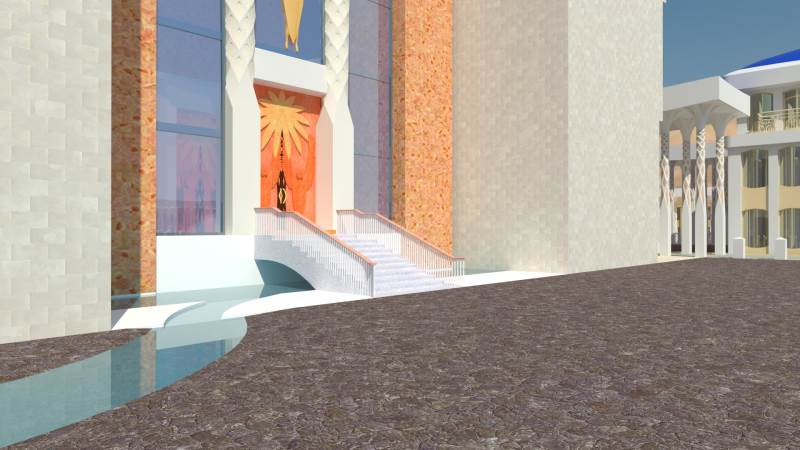|
Andrew |
Date: Friday, 24.05.2019, 22:24 |
Post # 1 |

Group: Administrators
Posts: 703
Status: Offline
|
Afterward he brought me again unto the door of the house; and, behold, waters issued out from under the threshold of the house eastward: for the forefront of the house stood toward the east, and the waters came down from under from the right side of the house, at the south side of the altar.
Then brought he me out of the way of the gate northward, and led me about the way without unto the utter gate by the way that looketh eastward; and, behold, there ran out waters on the right side.
(Ezekiel 47:1,2)
In the KJV it right. And in the NASB?
Then he brought me back to the door of the house; and behold, water was flowing from under the threshold of the house toward the east, for the house faced east. And the water was flowing down from under, from the right side of the house, from south of the altar.
He brought me out by way of the north gate and led me around on the outside to the outer gate by way of the gate that faces east. And behold, water was trickling from the south side.
(Ezekiel 47:1,2 — NASB )
south side! — In no case!
Where is the right side of every building?
The right side of any building is located to the right of the observer, who stands facing the building.
Therefore, the water that flows from under the threshold of the Temple on the right side has a source on the northern side of the Temple. Then this stream flows from the south side of the altar. And when Ezekiel left the temple complex and stood before the Eastern Gate, he saw that the stream flowed from the right, that is, on the north side of the gate. This is the description we see in the Masoretic text. NASB translators are obviously screwing up something.
So, if the water source is on the north side of the House, and then the stream flows on the south side, this means that anyone who enters the Temple must cross this water stream. Therefore, the stairs leading to the Temple should be made in the form of a bridge.

In accordance with the description in the prophecy of Ezekiel, this stream of water must cross the eastern part of the outer courtyard diagonally and leave the temple complex on the north side of the East Gate.
Every visitor to the Temple will have to wash his feet in this stream, because
... he that entereth in by the way of the north gate to worship shall go out by the way of the south gate; and he that entereth by the way of the south gate shall go forth by the way of the north gate: he shall not return by the way of the gate whereby he came in, but shall go forth over against it.
(Ezekiel 46:9)
Further, this stream of water should be divided into two streams. One stream will flow into the bed of Nahal Arugot, and this water will flow into the Dead Sea near Ein Gedi. Another stream will flow into the bed of Nahal Hever, a few hundred meters south of the Temple, and this water will flow into the Dead Sea near Ein Eglaim, in exact accordance with the prophecy of Ezekiel:
And it shall come to pass, that every thing that liveth, which moveth, whithersoever the rivers shall come, shall live: and there shall be a very great multitude of fish, because these waters shall come thither: for they shall be healed; and every thing shall live whither the river cometh.
And it shall come to pass, that the fishers shall stand upon it from Engedi even unto Eneglaim; they shall be a place to spread forth nets; their fish shall be according to their kinds, as the fish of the great sea, exceeding many.
(Ezekiel 47:9,10)
whithersoever the rivers shall come — here in the Hebrew text is the dual number, so it would be correct to say this: whithersoever two rivers shall come.
All these details prove that Ezekiel's prophecy about the Temple has material fulfillment, and we can fulfill this prophecy today, without expecting any natural disasters, moving mountains and the like, over which humanity has no power.
|
|
| |
| |
|
Andrew |
Date: Sunday, 26.05.2019, 21:28 |
Post # 2 |

Group: Administrators
Posts: 703
Status: Offline
|

the fishers shall stand upon it from Engedi even unto Eneglaim
|
|
| |
| |





















